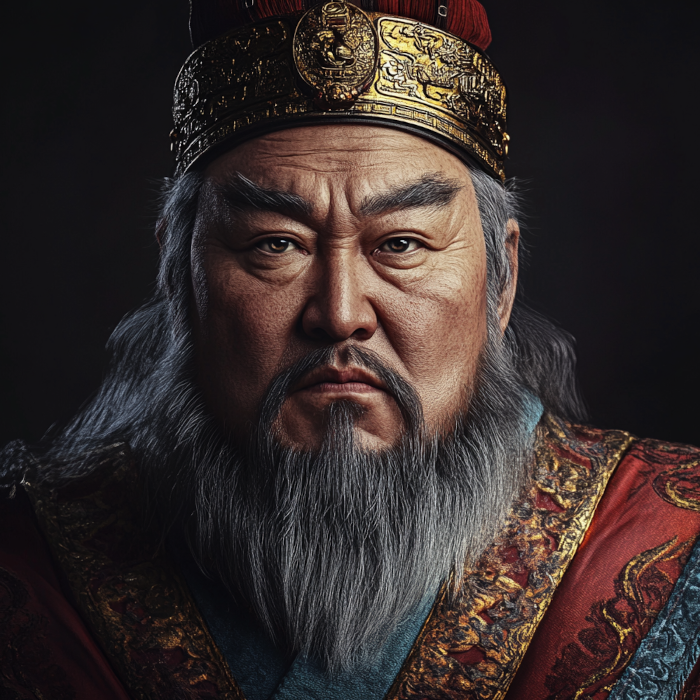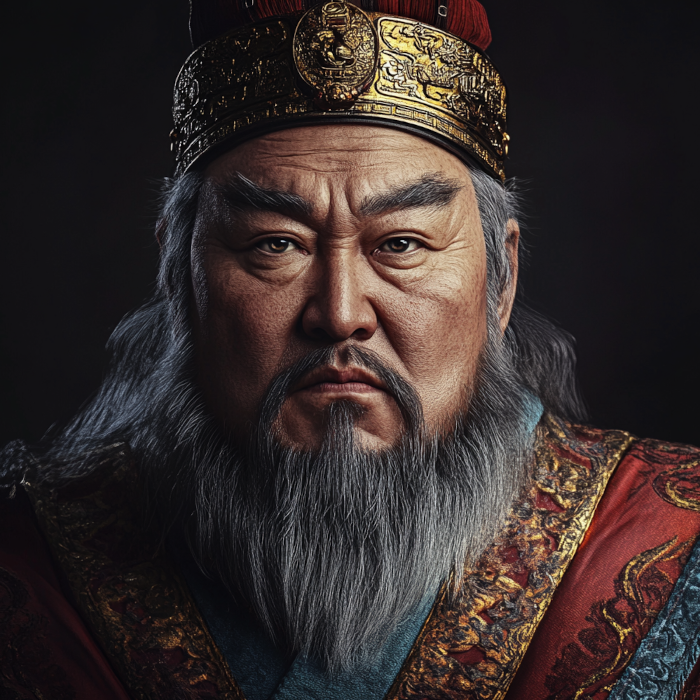


Kublai Khan (1215–1294) was the fifth Great Khan of the Mongol Empire and the founder of the Yuan Dynasty in China, which he ruled from 1271 until his death. A grandson of Genghis Khan, Kublai was one of the most important figures in Mongol and Chinese history. He successfully completed the conquest of China, which his predecessors had begun, and became the first non-Chinese emperor to rule the entire country. His reign marked the transition of the Mongol Empire from a nomadic confederation to a more settled, bureaucratic, and multi-ethnic state. Kublai Khan’s leadership transformed the Mongol Empire into a vast Eurasian empire and permanently altered the political and cultural landscape of China.
Birth and Family Background: Kublai Khan was born on September 23, 1215, during the height of the Mongol Empire, to Tolui and Sorghaghtani Beki, both of whom were influential figures in Mongol politics. Kublai was the grandson of Genghis Khan, the empire's founder. His mother, Sorghaghtani, was a Christian princess of the Kereit tribe and played a key role in preparing Kublai and his siblings for leadership. Kublai grew up with a strong sense of Mongol heritage, but he was also exposed to various cultures and religions, which shaped his views on governance.
Involvement in the Mongol Conquests: As a young man, Kublai participated in Mongol military campaigns, particularly in northern China, gaining valuable experience in leadership and military strategy. During the 1250s, Kublai was entrusted with governing the Mongol territories in northern China by his brother, Möngke Khan, who had become the Great Khan of the Mongol Empire. Kublai focused on building a stable administration in China, integrating Confucian scholars into his government, and adopting many aspects of Chinese culture and governance, which later became central to his rule.
Becoming Great Khan (1260): In 1259, Möngke Khan died during a military campaign, sparking a succession struggle within the Mongol Empire. Kublai faced opposition from his brother Ariq Böke, who also claimed the title of Great Khan. After a series of conflicts known as the Toluid Civil War, Kublai emerged victorious and was declared Great Khan in 1260. However, the conflict weakened the unity of the Mongol Empire, and from this point onward, the empire began to fracture into several khanates.
Conquest of the Song Dynasty: One of Kublai Khan’s major achievements was the completion of the Mongol conquest of China. Although the Mongols had already conquered northern China, the Southern Song Dynasty remained a formidable power. Kublai launched a series of military campaigns to defeat the Song, culminating in the capture of the Song capital, Hangzhou, in 1276. The final defeat of the Song came in 1279, when Mongol forces, under Kublai’s command, destroyed the last remnants of the Song navy at the Battle of Yamen, bringing all of China under Mongol control.
Founding the Yuan Dynasty (1271): In 1271, Kublai formally established the Yuan Dynasty and declared himself the Emperor of China. The Yuan Dynasty marked the first time that all of China was ruled by a non-Chinese dynasty, and Kublai sought to legitimize his rule by adopting Chinese customs, using Chinese bureaucracy, and supporting Confucian institutions. He moved the Mongol capital from Karakorum in Mongolia to Dadu (modern-day Beijing), further signaling the shift toward a more settled, imperial style of governance.
Sinicization of Mongol Rule: Although Kublai Khan was a Mongol by heritage, he embraced many aspects of Chinese culture and governance to rule his newly established empire. He employed Confucian scholars in his administration, adopted Chinese titles and rituals, and promoted Buddhism, Taoism, and other religious practices prevalent in China. However, he maintained Mongol traditions and upheld the Yassa, the traditional Mongol code of law.
Bureaucratic Reforms: Kublai reorganized the government to incorporate elements of both Chinese and Mongol systems. He retained many aspects of the Chinese civil service and bureaucracy, but he placed Mongols and other non-Chinese (particularly Central Asians and Persians) in key administrative positions to ensure loyalty to his rule. The Yuan Dynasty’s government was divided into administrative units that controlled various regions of the empire, which helped manage the vast and diverse territories Kublai ruled.
Cultural and Religious Tolerance: Like his grandfather Genghis Khan, Kublai Khan promoted religious tolerance within his empire. He supported Buddhism, Confucianism, Islam, Christianity, and other faiths, recognizing that his multi-ethnic and multi-religious empire required a policy of tolerance to maintain peace and order. Kublai himself was a devout Buddhist and patronized Buddhist institutions, but he also built mosques and Christian churches throughout his empire.
Promotion of Trade and the Silk Road: Kublai Khan’s reign saw the revival and expansion of the Silk Road, the ancient trade route that connected East and West. The relative stability of the Pax Mongolica allowed for safer trade across the empire, facilitating the movement of goods, people, and ideas between Europe, the Middle East, and Asia. Kublai’s empire became a hub of international trade, with merchants from places like Venice, Persia, and India flocking to China to engage in commerce.
The Venetian explorer Marco Polo visited Kublai Khan’s court in the late 13th century and described the wealth and sophistication of the Mongol Empire in his book "The Travels of Marco Polo." His accounts introduced Europeans to the grandeur of Kublai’s empire, contributing to European interest in Asia.
Grand Canal and Public Works: Kublai Khan invested in infrastructure projects to support his empire’s economy and improve communication and transportation. One of his major achievements was the expansion and restoration of the Grand Canal, a massive waterway that connected northern and southern China, facilitating the movement of grain and other goods. He also commissioned the construction of roads, bridges, and palaces, transforming the Yuan capital, Dadu, into a thriving cultural and economic center.
Cultural Exchange: Kublai Khan’s empire became a melting pot of different cultures, with influences from Chinese, Mongol, Persian, Arab, and European traditions. This cultural exchange was evident in the arts, architecture, and technology. The Mongol rulers patronized scholars, scientists, and artists from various parts of the empire, fostering advancements in fields such as astronomy, medicine, and literature.
Failed Invasions of Japan: Despite his successes in China, Kublai Khan faced several significant military setbacks, particularly in his attempts to expand his empire beyond China. The most notable failure was his two attempts to invade Japan in 1274 and 1281. Both invasions were thwarted by severe storms, known in Japanese history as kamikaze (divine winds), which destroyed much of the Mongol fleet. These failures weakened Kublai’s military prestige and drained resources.
Rebellion and Internal Struggles: Kublai’s rule faced challenges from within his empire as well. The Mongol administration in China was often seen as foreign by the local population, leading to tensions between the Mongol rulers and their Chinese subjects. In addition, Kublai faced resistance from other Mongol leaders who resented his adoption of Chinese customs and his focus on China rather than the broader Mongol Empire. These internal divisions contributed to the gradual weakening of the Yuan Dynasty after Kublai’s death.
Economic Strain: While Kublai Khan’s reign saw economic prosperity through trade and public works, his military campaigns and lavish spending on his court and projects placed a heavy strain on the empire’s finances. The cost of maintaining such a vast empire and the failure of some of his military expeditions further exacerbated the economic problems toward the end of his reign.
Death (1294): Kublai Khan died on February 18, 1294, at the age of 78. His death marked the beginning of the decline of the Yuan Dynasty and the fragmentation of the Mongol Empire. Kublai’s successors struggled to maintain control over the vast territories he had conquered, and the Yuan Dynasty faced increasing internal rebellion, eventually falling to the Ming Dynasty in 1368.
Legacy: Kublai Khan’s legacy is both monumental and complex. He is remembered as one of the greatest emperors of China, having unified the country and established the Yuan Dynasty, which, though short-lived, left a lasting impact on Chinese history. Kublai’s reign was a period of significant cultural exchange, economic growth, and political stability in the Mongol Empire, and his leadership transformed the Mongols from a nomadic confederation into a settled, imperial power.
Kublai’s contributions to trade, infrastructure, and cultural integration helped bridge East and West, fostering connections that influenced global history for centuries to come. However, his efforts to balance Mongol traditions with Chinese governance also led to tensions that contributed to the eventual downfall of his dynasty.

We use cookies
We use cookies and other tracking technologies to improve your browsing experience on our website, to show you personalized content and targeted ads, to analyze our website traffic, and to understand where our visitors are coming from. Privacy Policy.